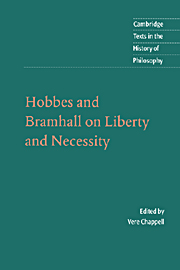Book contents
- Frontmatter
- Contents
- Acknowledgements
- List of abbreviations
- Introduction
- Chronology
- Further reading
- Note on the text
- Bramhall's discourse of liberty and necessity
- Hobbes's treatise Of Liberty and Necessity
- Selections from Bramhall, A Defence of True Liberty
- Selections from Hobbes, The Questions concerning Liberty, Necessity, and Chance
- Selections from other works of Hobbes
- Index
- Cambridge texts in the history of philosophy
Introduction
Published online by Cambridge University Press: 05 June 2012
- Frontmatter
- Contents
- Acknowledgements
- List of abbreviations
- Introduction
- Chronology
- Further reading
- Note on the text
- Bramhall's discourse of liberty and necessity
- Hobbes's treatise Of Liberty and Necessity
- Selections from Bramhall, A Defence of True Liberty
- Selections from Hobbes, The Questions concerning Liberty, Necessity, and Chance
- Selections from other works of Hobbes
- Index
- Cambridge texts in the history of philosophy
Summary
In 1645 the Marquess of Newcastle invited two of his acquaintances, Thomas Hobbes and John Bramhall, to have a philosophical discussion at his house in Paris. The three men were Englishmen, forced to live abroad by the Civil War at home; all three were prominent supporters of the bythen losing Royalist cause. Newcastle had been a commander in the Royalist army; Bramhall was not only a bishop in the Anglican Church but a forceful advocate of the King's position on matters of church governance; and Hobbes was a well-known political theorist whose recently published De cive was widely read as a defence of the English monarchy.
The subject set for the discussion was human freedom, on which the Marquess knew his guests had sharply different views; the discussion in fact became a debate between the two. After the event, Newcastle asked them to send him written statements setting forth their positions. Bramhall responded with a ‘discourse’ on liberty and necessity; and he must have sent a copy to Hobbes as well, for the latter's ‘treatise’ Of Liberty and Necessity followed Bramhall's work point for point, criticizing it in addition to presenting and defending his own views. Bramhall responded in turn with A Vindication of True Liberty from Antecedent and Extrinsical Necessity, which was both a point-by-point defence of his original position against Hobbes's criticisms and a critical attack on Hobbes's position.
- Type
- Chapter
- Information
- Hobbes and Bramhall on Liberty and Necessity , pp. ix - xxiiiPublisher: Cambridge University PressPrint publication year: 1999

